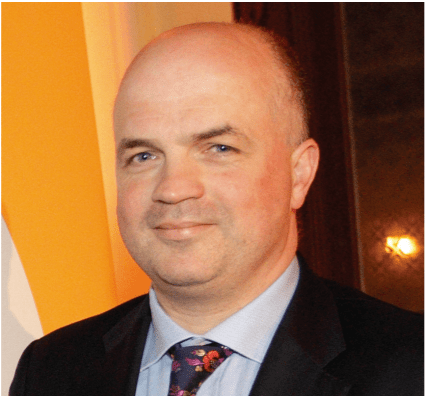33rd IHCA AGM and Annual Conference, virtual, Saturday 9 October
The Government must urgently implement measures that ensure our public health service is fit for purpose for patients
now and in the years to come, writes IHCA President Prof Alan Irvine
This year’s IHCA AGM and Annual Conference takes place after yet another sobering month in Irish healthcare, marred on the one hand by record waiting lists, which have passed the 900,000 mark and on the other hand by high-profile resignations from the Department of Health’s Sláintecare programme. Those departures were reportedly due to the lack of progress on establishing new regional structures for the health service and addressing our record waiting lists.
It is unacceptable that the latest waiting list figures confirmed that more than 907,000 people are on some form of a public hospital waiting list to be treated or assessed by a consultant. It is worth reflecting on that figure for a moment: That is equivalent to a fifth of the population or 11 times the capacity of a full Croke Park.
Any team playing in a championship with one-fifth of its positions vacant will not perform as it should, despite its best efforts to do so. It is the same in our public hospitals. Our public hospitals will not be able to address these record waiting lists until we field a full team by filling the one-in-five permanent hospital consultant posts, of over 700, that are currently vacant or filled on a temporary basis.
In addition, consultants need to be provided with increased beds, theatre and other facilities to enable them to treat patients on time. Even when the vacant permanent consultant posts are filled, further increases in our consultant staffing will be required to bring our acute services up to the EU average consultant staffing and to cater for HSE National Doctors Training and Planning (NDTP) projected increases in demand for care in the next seven years.
Shocking waiting lists
The shocking increase in National Treatment Purchase Fund (NTPF) waiting lists is the strongest indicator yet that the immense backlog of care is dangerously close to overwhelming our public hospitals. This is due not only to the pandemic or cyberattack on the HSE, but the persistent underinvestment in hospital infrastructure over the past decade, including bed capacity and consultant staffing which are both around 40 per cent below the EU average. The Government and health service must stop hiding behind the pandemic and cyberattack as the main reasons for these unacceptable figures, which regrettably are likely to worsen in the coming months as more people who have put off seeking care because of concerns about Covid now present for assessment and treatment.
The Association has warned that the waiting lists are inexorably climbing to the one million mark and have already done so if the more than 200,000 people waiting for hospital diagnostics such as MRIs, CTs and ultrasounds that are not on any NTPF list are included. In our recent Pre-Budget Submission, we estimate that it could take up to 14 years to clear the backlog of deferred care built up during the pandemic and bring our current unacceptable waiting lists under control. We therefore need the Department of Health to bring forward the long-awaited waiting list reduction plan and to provide realistic yet ambitious targets and timescales for the reduction of Ireland’s shocking waiting lists.
very single one of these numbers on waiting lists represents a person and a family seeking acute hospital care, while possibly deteriorating clinically, often experiencing pain and suffering, and the psychological distress of not knowing when they will be able to receive treatment. As hospital consultants, we want to help alleviate this distress and provide the timely care they need. But we are being prevented from doing so because there is insufficient capacity within the system.
Reducing the unacceptable number of 907,000 people on waiting list will unfortunately take years longer than necessary due to the Government failure to change its policies that are driving the highly trained medical specialists we need away from our public hospitals to practice in the private sector or abroad. This is a false economy in every respect, especially as fully staffed teams would result in better outcomes for patients, shorter lengths of hospital stay and better use of scarce hospital resources. This will only be possible by filling the one-in-five permanent hospital consultant posts that are currently vacant or not filled as needed and appointing significant additional consultants, together with expanding our hospital capacity.

Prof Alan Irvine
Pay inequality
To recruit the required number of consultants, proper conditions will have to be put in place to make posts in this country attractive. The elephant in the room is that the Government and health service management must end the pay inequity unilaterally imposed in October 2012 on consultants contracted thereafter. This is essential if our public hospitals are to succeed in bringing highly trained medical specialists home and arrest the non-stop annual haemorrhaging of newly qualified specialists who aspire to become consultants in a service which does not discriminate against them. This is the first important step in restoring trust, developing well-functioning public hospital and mental health services, and to provide timely high-quality healthcare to our public hospital patients. But this will not happen by itself.
In addition, the Government’s revised National Development Plan (NDP), to be published in October, needs to commit to funding a minimum of 6,000 additional public hospital beds to reduce bed occupancy rates, operate with appropriate infection control, including single occupancy rooms, and deliver more timely, safe care. This is in contrast with the increase of 2,600 acute beds included in the 2018 NDP.
Budget 2022 needs to ensure that public hospital and mental health services have sufficient levels of current and capital funding to provide timely, high-quality care to patients. It is essential that current spending on health this year to deal with Covid is retained and redeployed in 2022 and in future years to deal with existing deficits in bed capacity, hospital facilities and consultant staffing.
Specifically, the Government needs to end the consultant salary inequity imposed unilaterally in 2012 as it is the root cause of Ireland’s consultant recruitment and retention crisis and record waiting list. Otherwise, it is likely patients will continue to experience delayed diagnoses and poorer outcomes. The NTPF figures reveal that there has been a 52-fold increase in the number of patients waiting longer than a year for hospital inpatient or day case care since 2012, when the then Minister for Health imposed pay discrimination on hospital consultants contracted after that date.
On the establishment of the new regional health structures, the Association has long supported the restructuring of healthcare services to ensure greater alignment between community and hospital services, based on common geographic areas with the full integration of these services achieved through devolved authority, responsibility and power from the current excessively centralised system of administration.
To work effectively, all hospital and community health services should be merged into one organisation within specific geographic areas. We need to move away from a ‘command and control’ model to one that supports and enables flexibility and responsiveness at a local level. That capacity to flex and local empowerment to plan has worked successfully during the past 18 months of the pandemic and needs to be fully embraced for the future.
To recruit the required number
of consultants, proper
conditions will have to be
put in place to make posts
in this country attractive
Capacity deficits
HIQA’s recent report on the monitoring and regulation of health services confirms that while some areas of improvement were made in our health service last year in response to Covid, we still face the same long-standing issues in our system, namely workforce shortages, chronic overcrowding and widespread capacity deficits.
One such longstanding concern is the number of patients on trolleys awaiting a hospital bed in our public hospitals, which reached 464 on 13 September – the highest level at time of writing since the start of the pandemic. This total is 80 greater than the 384 described in 2006 by then Minister for Health Mary Harney as a ‘national emergency’. If hospitals are already under such pressure during what is traditionally a quieter time for the health service, what can we expect during the winter period?
The continued risk of Covid-19 infection means that any overcrowding in our emergency departments is unacceptable and cannot be tolerated. Such overcrowding will also result in the further cancellation of scheduled essential hospital surgical and other treatment, which has already been decimated as a result of the pandemic.
The shocking waiting lists are a stark reminder that despite the success of the vaccine roll-out, the hard work and dedication of frontline doctors and their colleagues, together with the resilience of the public, our public hospitals now face a challenge of almost equal magnitude to Covid. To overcome this challenge requires urgent action by Government to create an environment in our health services that medical specialists and wider staff want to work in, and that patients have trust in.
The hospital consultant contract negotiations, which commenced on 2 September under independent Chair Ms Marguerite Bolger SC, are critical to this and must be successful in finding workable solutions to the root causes of our recruitment and retention crisis.
The solutions to resolving the crisis in our public hospitals and mental health services are ‘hiding in plain sight’. The Government must embrace them and implement them, so that our public health service is fit for purpose for the patients of today and in the years to come.













Leave a Reply
You must be logged in to post a comment.